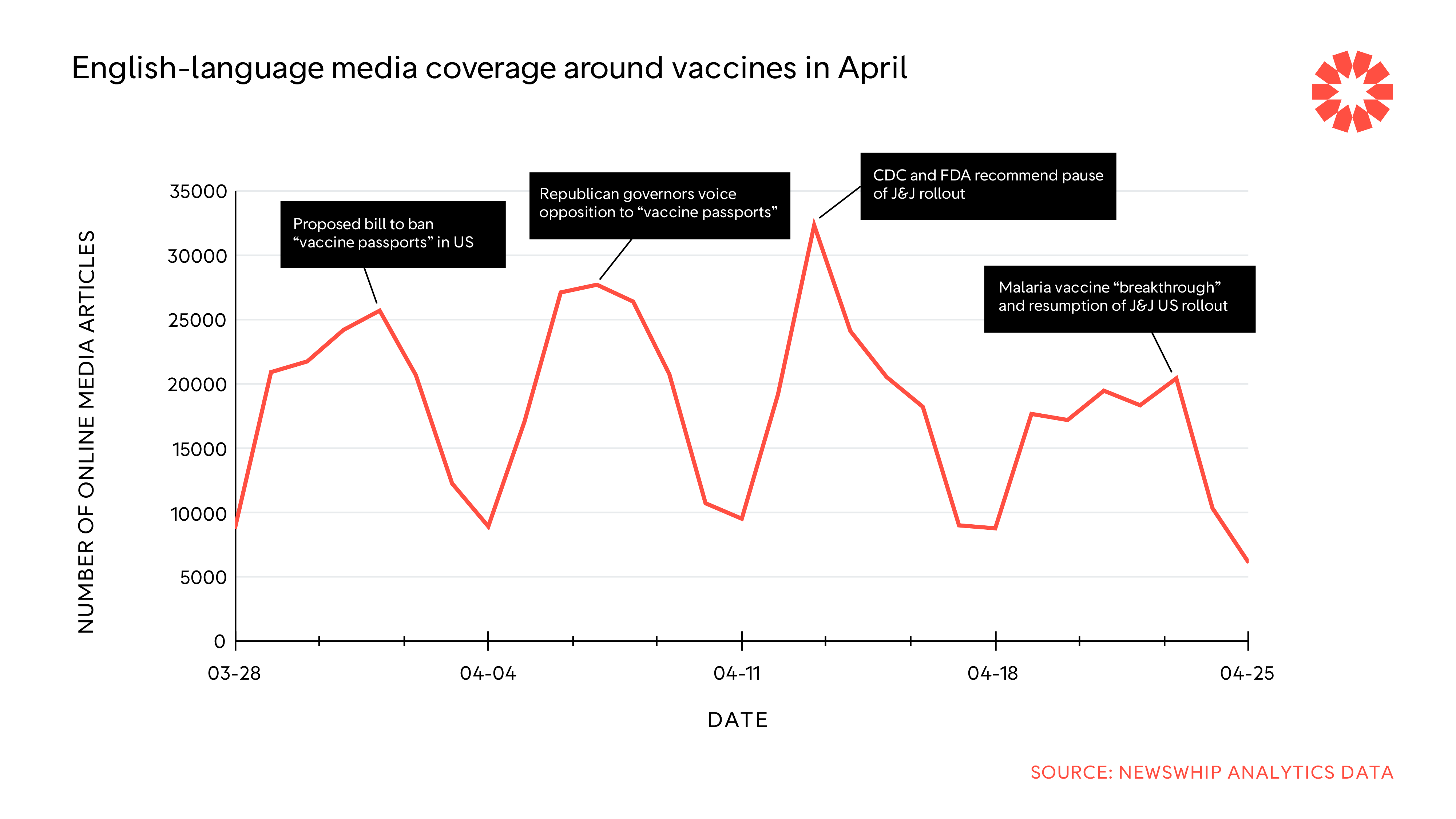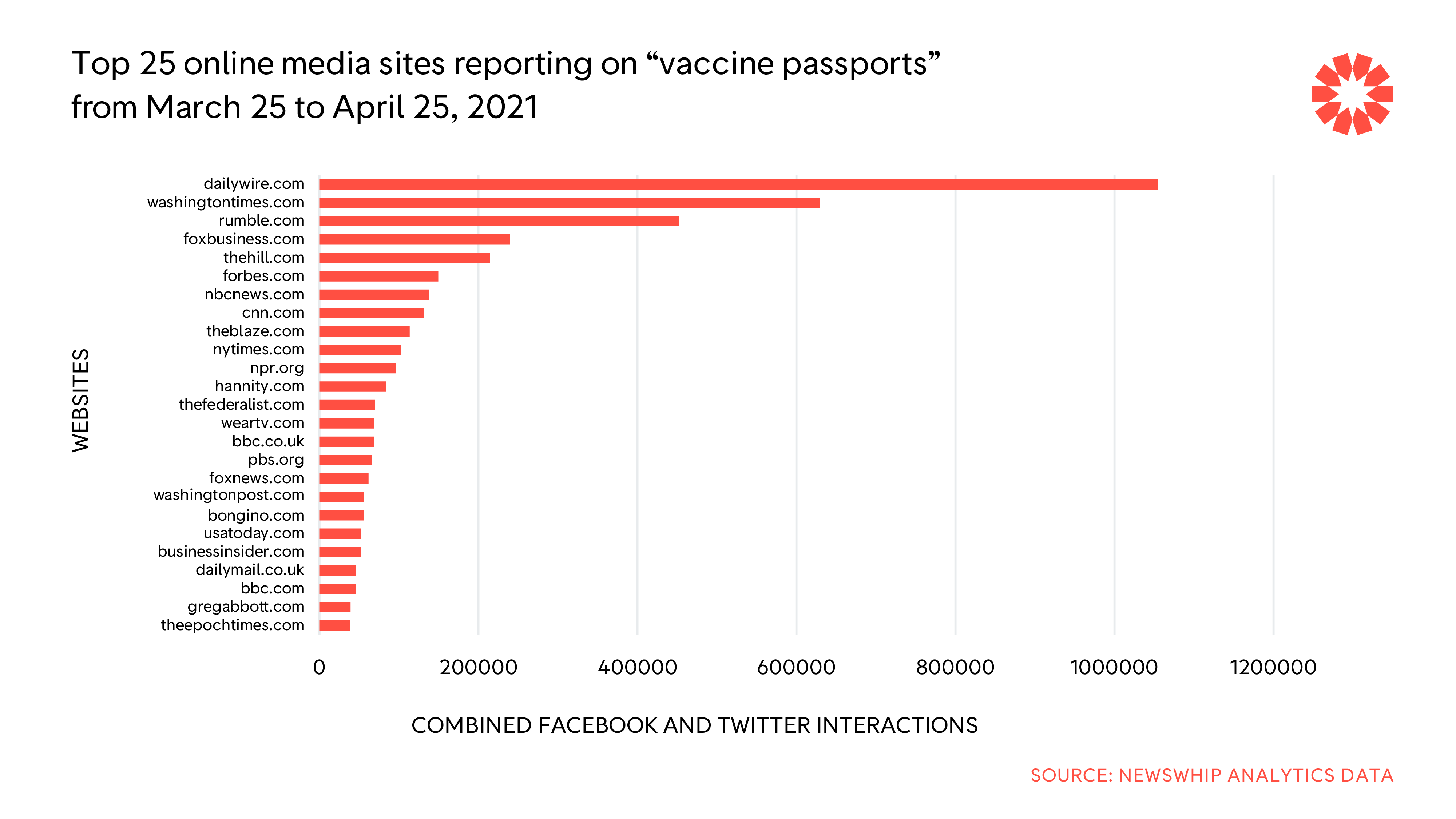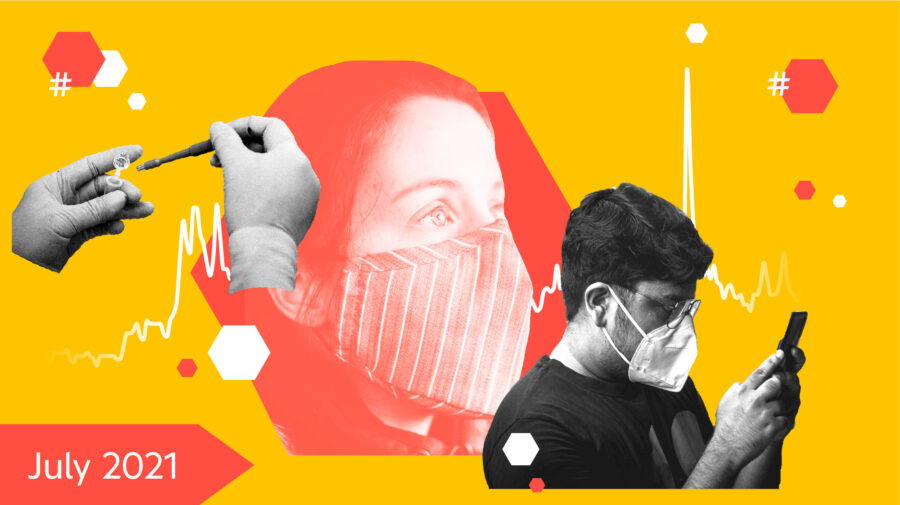This is the first installment of a four-part series, to be published at the start of each month, that provides a summary of the key trends and insights on information disorder related to vaccines over the past 30 days. As First Draft continues to monitor Covid-19 vaccine misinformation around the world, these reports are designed to highlight the most relevant media trends, narratives, emerging threats and data points we identify.
Media Trends
Over the course of April, English-language media coverage related to vaccines revolved around three key themes: opposition to “vaccine passports” in the US, the safety of the Johnson & Johnson vaccine and the Pfizer vaccine’s effectiveness in younger adults.
Coverage of vaccines generally peaked on April 13, following the US Centers for Disease Control and Prevention and the Food and Drug Administration’s joint recommendation to pause the J&J vaccine’s rollout because of a possible link to rare blood clotting disorders.

Two other spikes occurred on April 1 and April 7. The first spike coincided with the introduction of a bill aimed at banning “vaccine passports” in the US, while the second spike coincided with efforts by Republican governors to oppose potential “vaccine passport” mandates. Positive clinical trial results for a new malaria vaccine along with the CDC and FDA’s recommendation to resume rolling out the J&J vaccine on April 23 also generated significant media attention.
The Washington Times’ report that Florida Governor Ron DeSantis was readying an executive order to ban “vaccine passports” was the most engaged-with article across Facebook, Twitter and Pinterest, generating almost half a million social interactions. Several related articles, as well as Texas Governor Greg Abbott’s executive order banning “vaccine passports,” featured among the top ten most engaged-with articles on social media. These reports fueled pre-existing and misleading online narratives about vaccines infringing on individual liberties.
Reports about Pfizer’s vaccine trial on adolescents, which showed “100% efficacy” — there were no Covid-19 cases observed in the vaccinated group (1,131 participants) versus 18 cases in the placebo group (1,129 participants) — also generated significant traction on social media. Three related articles attracted more than 100,000 social interactions. Despite the positive trial results, narratives questioning the safety and necessity of vaccinating children flourished on social media.
Finally, suggestions from Pfizer CEO Albert Bourla that people might need Covid-19 booster shots within the next 12 months attracted huge interest online. A CNBC report that relayed Bourla’s comments garnered more than 150,000 social media interactions. The news sparked narratives that Pfizer’s vaccine is purely financially motivated. These narratives have begun to gain traction on French and German social media as well as in the US.
Vaccine Narratives
“Vaccine passports” infringe on your freedom, along with baseless claims they will be used to control the population
Whether it’s masks, stay-at-home orders or mandatory vaccinations, various communities have leaned heavily on concerns about personal liberty to challenge what they perceive as attempts to curtail their rights. As such, the term “vaccine passports” — used to describe digital or physical records of immunization that people might have to show when they enter a business or a public area, or when they board a flight — are being framed by many as a looming encroachment on individual rights by government and Big Tech. Republicans in particular have been accused of leveraging this sentiment to open a new front in the “pandemic culture wars.”
Despite White House Press Secretary Jen Psaki saying the Biden administration would not support a federal mandate for vaccine certificates, false claims and conspiracy theories surrounding “vaccine passports” continue to circulate online. Some of these include the idea that “vaccine passports” are part of the “Great Reset” conspiracy theory — which claims that a cabal of elites is using the pandemic to impose a new globalist world order — and will be used to mandate vaccines and more control over the population. Other misleading claims compare a vaccine certificate program with China’s “social credit” system.
Many groups pushing this narrative downplay the severity of Covid-19 — they often cite misleading statistics around coronavirus death rates or tout the immune system as a more powerful weapon against the virus. They see vaccines and “vaccine passports” as unnecessary and ineffective, rhetoric that could potentially erode trust in Covid-19 vaccines and increase vaccine hesitancy. As employers and schools consider vaccine mandates and the narrative is increasingly politicized, it is likely to remain a constant within Covid-19 vaccine discourse.
Covid-19 vaccines are untested and unsafe, citing recent news around the J&J and AstraZeneca vaccines
Narratives challenging the safety of vaccines have been used to spread misinformation long before the Covid-19 pandemic. But the speed of rolling out Covid-19 vaccines in particular has encouraged the pervasive false narrative that the vaccines are untested and unsafe. Unsurprisingly, this narrative has featured heavily in online vaccine discussions over the last month, following the pause of the J&J vaccine in the US and many European countries’ decisions to restrict the AstraZeneca vaccine to certain age groups. Highly followed social media accounts have framed these developments as proof that Covid-19 vaccines are untested and unsafe. In fact, a false narrative claiming that investigations into the safety of the J&J and AstraZeneca vaccines are intended to divert attention away from “more dangerous” mRNA Covid-19 vaccines has now begun to spread in the US and Western Europe. In France, the narrative has been amplified by prominent politicians.
The false claim that Covid-19 vaccines are untested has also been used to support narratives that frame the vaccines as “experimental” and their recipients as “guinea pigs.” This narrative, which first began to gain traction in November, has continued to pervade social media over the last month. For example, Randy Hiller, a Conservative Party MPP in Ontario, linked to the Canadian National Advisory Committee on Immunization‘s recommendation to suspend the use of AstraZeneca’s vaccine for under-55s to describe the vaccine’s rollout as “experimentation.” His Facebook post received almost 3,000 shares. The message was then spread on several Canadian-linked Facebook Groups and Pages.
Pauses of the J&J and AstraZeneca rollouts are part of a wider conspiracy to push mRNA-based vaccines and alter people’s DNA
Over the last month, unevidenced claims that the pause of the J&J rollout in the US was politically motivated have flourished on social media. These narratives came largely off the back of a statement from former US President Donald Trump on April 13. In it, he suggested that “perhaps all of this was done for politics or perhaps it’s the FDA’s love for Pfizer.”
But more far-reaching conspiratorial narratives have spread in English- and French-language social media communities. Narratives suggesting that governments want to promote mRNA vaccines over viral vector vaccines — such as the J&J vaccine — in order to alter people’s DNA have circulated on 4chan’s /pol message board and among US-linked Twitter accounts. These conspiracy theories have also reached France-linked Twitter communities. Some tweets claiming that young people in particular are being targeted have generated hundreds of interactions.
Emerging threats and data deficits
Data deficits are where high levels of demand for information about a topic are not adequately matched by a supply of credible information. Where data deficits exist, rumors, speculation and misinformation are more likely to spread. Countering data deficits requires healthcare providers and institutions to engage in pre-emptive research that can inform proactive messaging related to these data deficits, such as “pre-bunks” and explainer pieces.
Covid-19 booster shots
As mentioned earlier, Pfizer CEO Albert Bourla said last week that a third Covid-19 vaccine dose would “likely” be needed within 12 months, adding that annual boosters could be a possibility. Given the persistent data deficit around vaccine efficacy on new strains as well as the relative lack of transparency around manufacturers’ contractual ability to raise future vaccine prices, narratives framing booster shots as financially motivated could flourish. Suggestions that booster shots could be a ploy by pharmaceutical companies to make profits have already spread among French- and German-language users on social media.
Covid-19 vaccine misinformation around children
The topic of children and vaccines is fueling false narratives and claims around the world. News that a Stanford University trial would see children as young as 6 months old receive the Pfizer vaccine prompted social media users to baselessly claim child abuse, despite the strict ethical protocols around clinical trials in children. False claims alleging that a 2-year-old girl died from the Pfizer vaccine and that an infant died by breastfeeding shortly after the child’s mother had received the Pfizer vaccine have added to the panic.
In France, social media users are pushing the hashtag #touchepasamesenfants (don’t touch my children) following a report in the satirical newspaper Le Canard Enchaîné that the government is considering vaccinating children 10 and older by the end of the summer. Meanwhile, an open letter from 100 Israeli doctors urging caution around vaccinating children in the country resulted in the misleading claim that the vaccine is “rushed.”
Because little is known about the effectiveness and effects of Covid-19 vaccines on children — some trials are ending while others are just beginning — the topic remains vulnerable to speculation and rumor.
The use of graphic and emotive visual content to portray vaccines as dangerous is a defining feature of anti-vaccination groups. Children are often used to add even more emotional bite to these messages. As vaccine trials begin on young children and Phase 3 trials wrap up for kids ages 12-15 — paving the way toward their vaccination — we can expect an influx of harmful narratives and graphic visual content.
The widespread weaponization of the Vaccine Adverse Event Reporting System (VAERS)
VAERS is a CDC- and FDA-managed early warning system and database where individuals voluntarily report potential issues with vaccines. If concerning patterns emerge, the two agencies will investigate. Established in 1990, it is open to the general public, allowing anyone to log and view vaccine reports. But the reports “sometimes lack details or contain errors” — they are effectively unverified claims. Reports of vaccines causing autism — a claim that has been roundly debunked — have often appeared in the system.
Despite the CDC clearly stating that “VAERS data alone cannot determine if the vaccine caused the reported adverse advent,” the system is being used by anti-vaccine activists to undermine the legitimacy of Covid-19 vaccines. A cursory search for VAERS on Twitter reveals a stream of tweets citing the monitoring system as evidence that Covid-19 vaccines are dangerous. Anti-vaccine activists have also established unofficial VAERS sites that include misleading claims about Covid-19 vaccines and their effects.
In focus: ‘Vaccine passports’ and the US right-wing media blitz
The idea of “vaccine passports” is not new. Since the Pfizer vaccine’s emergency use authorization in November 2020, vaccine certificates have been floated as a way to mitigate the spread of Covid-19 across national borders. Most of the early conversations around “vaccine passports” related to proposals in Europe. The EU is now poised to roll out a program that may set the global standard.
There are legitimate questions about how “vaccine passports” might work, such as how they could further discriminate against minority communities that have been disproportionately affected by Covid-19. But in the US, Republicans have fiercely challenged the issue on ideological grounds, framing it as an assault on freedom and an example of government overreach (see Vaccine narratives section above).
Led by The Daily Wire, a news site that has spread conspiracy theories, various right-wing media outlets created an online frenzy that attacked and firmly politicized “vaccine passports” — positioning the idea as a new political flashpoint in the pandemic culture war. Through these efforts, an unnuanced narrative emerged that reduced any discussion of digital vaccine certificates to matters of personal liberty.
Using NewsWhip Analytics, First Draft identified 12,593 online articles that mentioned “vaccine passports” in the headline between March 25 and April 25. The Daily Wire, The Washington Times and Rumble topped the list in sharing news articles mentioning these words. They not only set the agenda by publishing articles on “vaccine passports” before other outlets, but their stories received significant attention on social media. In total, these three outlets produced 35% of the more than 6 million Twitter and Facebook interactions from these articles.

These articles were able to spread widely on social media thanks to a tightly knit group of conservative Facebook Pages that amplified them. These included Ben Shapiro (founder of The Daily Wire), ForAmerica, Dan Bongino, Michael Knowles, Matt Walsh, Dinesh D’Souza, Andrew Klavan and Charlie Kirk. The articles were also helped by an army of public Facebook Groups such as Open Oregon, Pennsylvania Opening Businesses/Defying the Governor, Millions March Against Mandatory Covid Vaccinations, and Fellow Patriots.
Articles published by NBC, CNN, The New York Times, NPR and The Washington Post were picked up by right-leaning Facebook Pages and Groups, such as Health Freedom Minnesota, Gary Bauer, Informed Choice Michigan, Truth Tellers and Keep America Great Warriors, where they reframed the posts to lambaste the idea of digital vaccine certificates. In the current era of information overload, this ongoing tactic underlines the ease with which headlines and news stories on social media can be hijacked and repurposed.






